Ending cholera in Somalia
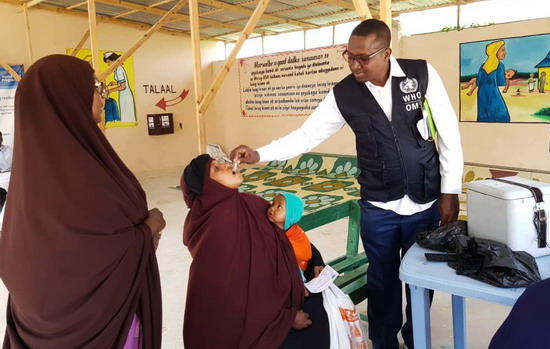 A woman receives oral cholera vaccination in Kahda district, Banadir region, Mogadishu. Photo: Maryan Abdi Sheikh 23 June 2019 – Combating cholera is a challenge for Somalia. Due to protracted crisis destroying the water and sanitation infrastructure and dilapidated health systems, coupled with regular flooding, several states are recurrently being hit by cholera epidemics. Despite these grave challenges, the Ministry of Health of Somalia, WHO and other partners face issues head on to identify sustainable solutions.
A woman receives oral cholera vaccination in Kahda district, Banadir region, Mogadishu. Photo: Maryan Abdi Sheikh 23 June 2019 – Combating cholera is a challenge for Somalia. Due to protracted crisis destroying the water and sanitation infrastructure and dilapidated health systems, coupled with regular flooding, several states are recurrently being hit by cholera epidemics. Despite these grave challenges, the Ministry of Health of Somalia, WHO and other partners face issues head on to identify sustainable solutions.
Unlike in 2017, the country continues to report cholera cases sporadically. The country faced one of the largest cholera outbreaks in 2017 with over 78 000 cases, including 1159 deaths. In 2019, the country has so far reported 1041 cases of suspected cholera, including one related death from about 25 districts of the States, which are located in the basins of the Jubba and Shabelle rivers.
Owing to the improved capacity of the health system to detect, treat and prevent cholera in the country, the number of cases have decreased in recent times but the disease continues to claim lives and cause suffering.
Practical and solid steps are needed to save the people of Somalia from the recurrent threats of cholera.
One of the largest oral cholera vaccination campaigns in a fragile setting in Africa gets under way
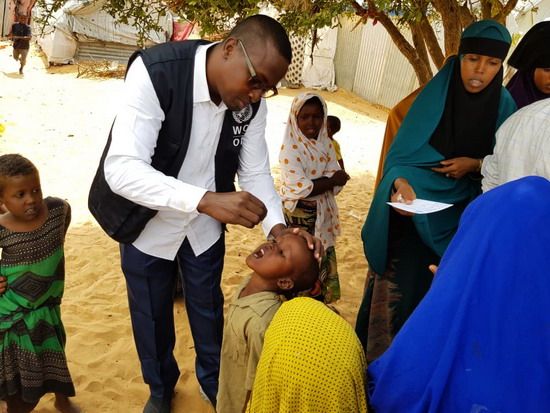 Somali health authorities and WHO are conducting Africa’s largest immunization campaigns using oral cholera vaccines (OCV) with the support of the United Nations Children’s Fund, Gavi, the Vaccine Alliance, and the Global Task Force for Cholera Control.
Somali health authorities and WHO are conducting Africa’s largest immunization campaigns using oral cholera vaccines (OCV) with the support of the United Nations Children’s Fund, Gavi, the Vaccine Alliance, and the Global Task Force for Cholera Control.
The campaign, which runs from 22 to 28 June 2019 in high-risk areas of Somalia, will vaccinate more than 650 000 children aged one year and above to eliminate the risk of the disease among vulnerable populations and to prevent recurring cholera outbreaks in the country.
“No one should die of cholera in the 21st century, especially when we have an affordable and easily administrable cure. It remains our collective responsibility to save lives and end cholera from Somalia. We remain committed to keep the country free from future cholera outbreaks,” said Dr Mamunur Rehman Malik, WHO Representative for Somalia.
Before the campaign was launched, social mobilization teams were successfully trained in Balad and other targeted districts. Ministry of Health staff facilitated the training sessions. Polio workers and UNICEF's 'communication for development' teams briefed front-line health workers on vaccination techniques, record keeping and also how to search for those who missed vaccination.
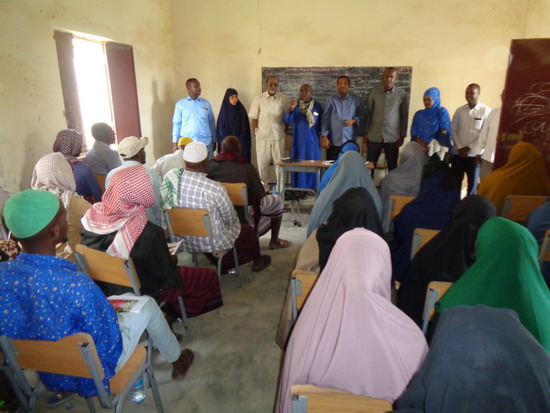 Social mobilization team training in Balad. Photo by: Ali Hassan
Social mobilization team training in Balad. Photo by: Ali Hassan
The Health Minister of Federal Government of Somalia HE Dr Fauziya Abikar Nur commented on the cholera situation in Somalia, highlighting challenges and efforts, saying, “Cholera remains one of our major public health threats. We now have the means and solutions to prevent outbreaks in Somalia. We continue to work with WHO and our other partners to save lives and prevent cholera on a long-term sustainable basis.”
On the first day of the campaign, a total of 111 010 people were vaccinated, which includes 52 518 people aged 1 to 15. The current pre-emptive campaign using OCV is expected to play a major role in eliminating the risk of occurrence of cholera among vulnerable populations. As part of the country-led strategy to prevent cholera outbreaks in Somalia, health authorities and WHO are using the OCV in combination with other proven interventions such as improving access to safe water and sanitation and improving hygiene as a long-term sustainable solution to eliminate the risk of recurrent cholera outbreaks.
Related link
For additional information, kindly contact:
Dr Mutaawe Lubogo
Epidemiologist
WHO Somalia
+252 612 857 531/+256 701 733 699
Ms Fouzia Bano
Communications Consultant
WHO Somalia
+252 619 235 880
Vaccines are saving millions of lives of children in Somalia: urgent need to scale up routine immunization programme
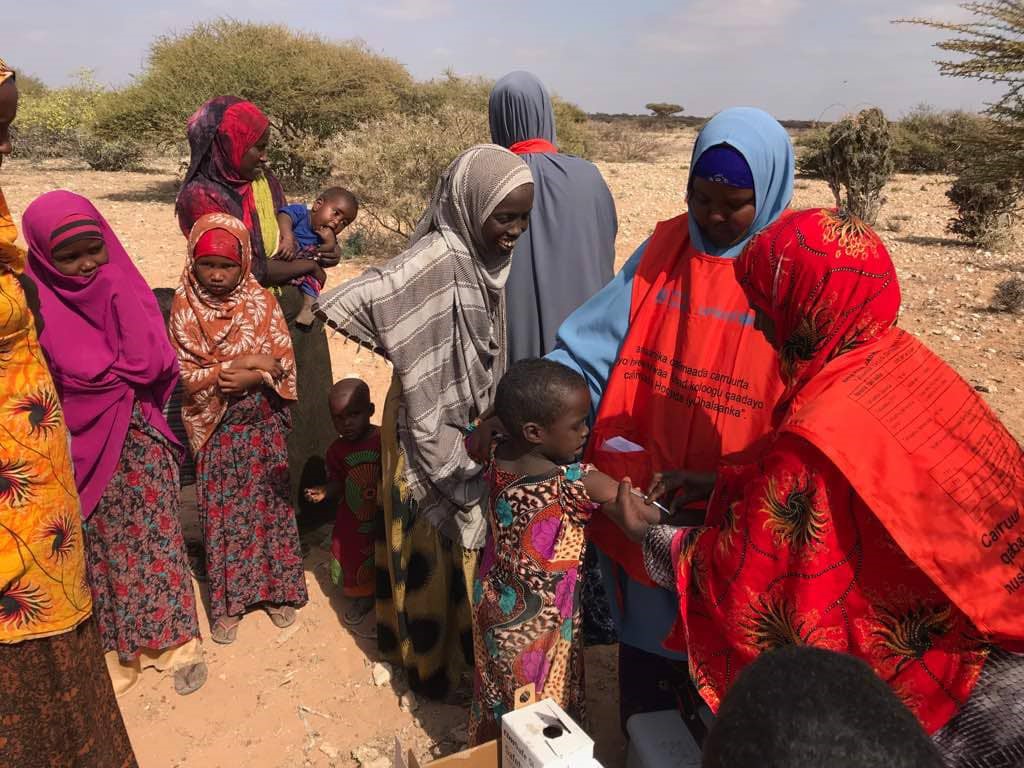 7 May 2019 – From the moment we’re born, we’re all at risk of contracting diseases. So the question is, are we aware enough? Are we responsible enough? Are we immune enough? Not long ago infections like influenza, tetanus, chickenpox and measles were prolonged, painful illnesses, which often resulted in death. Immunization saves millions of lives every year and is widely recognized as one of the world’s most successful and cost-effective public health interventions.
7 May 2019 – From the moment we’re born, we’re all at risk of contracting diseases. So the question is, are we aware enough? Are we responsible enough? Are we immune enough? Not long ago infections like influenza, tetanus, chickenpox and measles were prolonged, painful illnesses, which often resulted in death. Immunization saves millions of lives every year and is widely recognized as one of the world’s most successful and cost-effective public health interventions.
The Expanded Programmme on Immunization (EPI) started in Somalia in 1978 with the support of WHO and UNICEF. Due to the prolonged conflict and instability Somalia’s health system, including immunization services, is very weak, fragmented and severely under-funded. Control of vaccine-preventable diseases remains a huge challenge in Somalia, due to the low routine immunization coverage and the continued inability to reach children in security-compromised areas, hard-to-reach areas, nomadic children and competing health priorities for parents other than immunization of children. Low routine immunization coverage and a history of serious outbreaks that have hit Somalia in the past are a strong reminder of the risks posed by large cohort of un-immunized children. Vaccine-preventable diseases are prevalent in Somalia and child mortality is 137 per 1000 live births.
Somalia has been providing the traditional 6 antigens in routine immunization and with the support of GAVI - the Vaccine Alliance and immunization partners like UNICEF and WHO. The country has introduced pentavalent vaccine in 2013 and inactivated polio virus vaccine in 2015 and plans to introduce measles-containing-vaccine second-dose (MCV2) in 2020. With the continuous support of GAVI, Centers for Disease Control and Prevention, Atlanta, Bill & Melinda Gates Foundation and Rotary International and other important donors immunization coverage has improved in recent years; however, Somalia has still not attained the desired levels of coverage.
To improve immunization coverage more efforts needs to be in place for integrated approach along with other programmes like nutrition, malaria, water and sanitation and communication programmes to complement the reach of immunization and improve coverage of all eligible children with equity.
Somalia faced a deadly measles outbreak in 2017; out of the 31 000 people affected, 83% were children under the age of 10. WHO Somalia’s Emergency Response team, Somali national authorities, and partners targeted 4.7 million children in the nationwide measles campaign. During this intervention, around 4.5 million children were vaccinated. As a result of the nationwide immunization campaign conducted, as of April 2019, Somalia witnessed a decline in the trend of cases reported this year. This steady progress can be attributed to partners’ commitment to strengthen routine immunization and to reach out to unvaccinated children to boost their immunity. However, Somalia’s children are still not out of danger – measles outbreaks are likely to spread in security-compromised inaccessible areas.
 Somalia’s last outbreak of wild poliovirus, which occurred from 2013 to 2014, affected 194 children. Since then, as a result of mass and more focused immunization campaigns, and robust surveillance for polio symptoms to guide immunization activities, the country has been free of wild poliovirus. However, due to the challenges faced in reaching hard-to-reach areas, the country is currently experiencing 2 outbreaks of rare strains of the poliovirus, which have affected 13 children so far. The last nationwide polio campaign, conducted in March, vaccinated more than 2.7 million children under 5. More than 84 000 children were vaccinated for the first time.
Somalia’s last outbreak of wild poliovirus, which occurred from 2013 to 2014, affected 194 children. Since then, as a result of mass and more focused immunization campaigns, and robust surveillance for polio symptoms to guide immunization activities, the country has been free of wild poliovirus. However, due to the challenges faced in reaching hard-to-reach areas, the country is currently experiencing 2 outbreaks of rare strains of the poliovirus, which have affected 13 children so far. The last nationwide polio campaign, conducted in March, vaccinated more than 2.7 million children under 5. More than 84 000 children were vaccinated for the first time.
Marked during the last week of April, World Immunization Week aims to promote the use of vaccines to protect people of all ages against disease. WHO wants to assure parents and communities in Somalia that vaccines are safe, effective, and can lead to lifetime immunity from diseases.
While celebrating World Immunization Week with the theme “Protected Together: Vaccines Work”, Dr Mamunur Rahman Malik, WHO Representative for Somalia, called for scaling up the routine immunization programme in Somalia through working together with partners, communities and grass-root level organization. In 2018, Somali authorities, WHO and partners vaccinated more than 400 000 children against measles as part of routine immunization programme. Yet, about 170 000 children were missed or did not receive the first dose of measles vaccine last year. “Our priority is to reach out to all these children who misses the routine vaccine doses or remain unvaccinated owing to access or any other barrier. Leaving no child behind, we can ensure every child’s right to lead a healthy and productive life- if all who need to vaccinated are vaccinated in a timely way,” he stated.
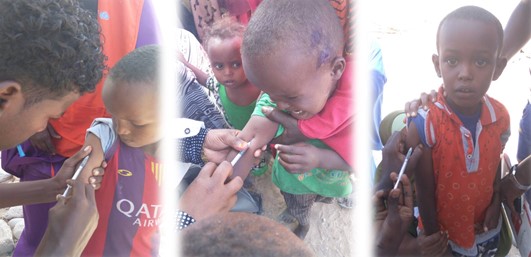
In the last decade, Somali health authorities and WHO worked with Gavi and other key partners to strengthen routine immunization. This protected 2.4m children against 8 vaccine-preventable childhood diseases.
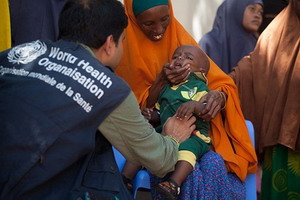 Somalia has shown remarkable progress in achieving good immunization coverage for some diseases that is realistically feasible to achieve in a fragile state, lot of works still need to be continued and scaled up to fill the immunization gaps through enhancing partnerships with other local stakeholders which is the key theme of this year’s World Immunization Week. Responding to outbreaks of measles or polio is a priority but can be prevented through achieving high coverage in routine immunization programme and also by reaching out to the children who do not receive any vaccine during the first year of their life.
Somalia has shown remarkable progress in achieving good immunization coverage for some diseases that is realistically feasible to achieve in a fragile state, lot of works still need to be continued and scaled up to fill the immunization gaps through enhancing partnerships with other local stakeholders which is the key theme of this year’s World Immunization Week. Responding to outbreaks of measles or polio is a priority but can be prevented through achieving high coverage in routine immunization programme and also by reaching out to the children who do not receive any vaccine during the first year of their life.
Despite the gains made by vaccination over the years, there are still unvaccinated and under-vaccinated children in Somalia today. As a consequence, millions of children are being put at risk against vaccine-preventable diseases. As part of this year’s campaign, grass-root level vaccinators who spearhead all barriers to reach every child in inaccessible areas of the country were honoured as immunization heroes. Their roles in keeping children healthy and securing a safer future has been acknowledged throughout the country.
Somalia joins the world in marking World Health Day
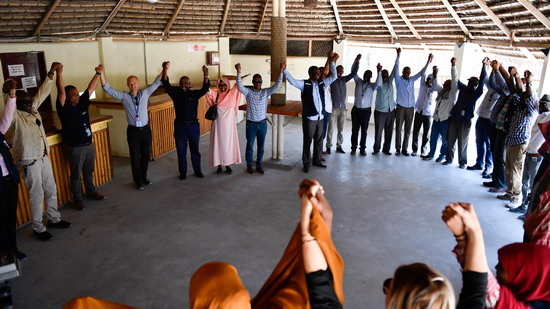 Mogadishu, Somalia, 9 April, 2019 – WHO in Somalia joined the world in marking World Health Day on 7 April by forming a human solidarity chain with representatives of United Nations agencies and key partners in Mogadishu. All around the world solidarity chains were formed to mark the Day and symbolize the importance of strong partnership and commitment in improving health care.
Mogadishu, Somalia, 9 April, 2019 – WHO in Somalia joined the world in marking World Health Day on 7 April by forming a human solidarity chain with representatives of United Nations agencies and key partners in Mogadishu. All around the world solidarity chains were formed to mark the Day and symbolize the importance of strong partnership and commitment in improving health care.
The theme of this year’s campaign was improving primary health care ‒ an entry point to the health care system ‒ as a path to achieving universal health coverage. Universal health coverage means that all people and communities can access quality health care, in an equitable manner, without being exposed to financial hardships.
Somalia is currently in the process of finalizing a roadmap in its drive to progress towards universal health coverage. This roadmap complements Somalia’s national health policy goals, and takes into consideration the current health situation across the country. With support from WHO and key partners, including donors and UN agencies, Somalia will look at ways to support communities so they can access health services.
“The Somali people are among the most resilient in the world,” said HE Dr Fauziya Abikar, Minister of Health of Somalia’s Federal Government. “If we focus on primary health care through which a mother and child can access the best services, we can contain bigger challenges.”
The Head of the UN Support Office Mr Amadu Kamara stated, “For a country like Somalia, where life expectancy for women and men is low, improving primary health care is of utmost importance. We express our solidarity and support, on behalf of all UN agencies in the country, towards using primary health care as a fundamental approach to improving health care.”
“Between 80 and 90% of essential health services can be delivered at primary health care level, including in emergencies,” said Dr Mamunur Malik, WHO Representative in Somalia. He added that WHO and Member States were promoting family practice-based, primary health care as a way to improve the overall health situation in countries. Dr Malik called upon all actors, from policy-makers to UN agencies and individuals in the community to come together to work towards the equitable and attainable goal of “Health for all, by all”. He also commended health workers in Somalia, particularly women, for their dedication to providing health services under challenging circumstances in the country.
In Hargeisa, on World Health Day, health authorities presided over a graduation ceremony for 12 medical doctors from remote rural areas after they had completed a 9-month training course in emergency obstetric care, aiming to save the lives of mothers and newborns. The training was conducted by health authorities, WHO, the University of Hargeisa and other partners.
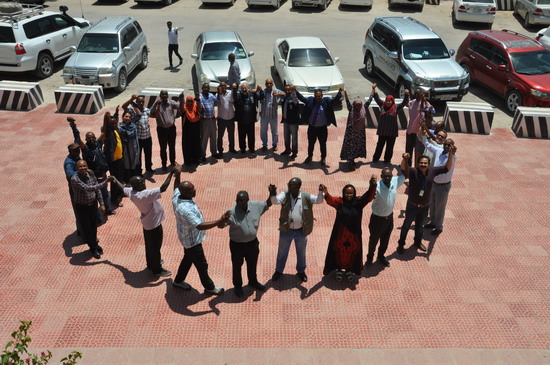 In Baidoa, health authorities and representatives of UN agencies came together to celebrate the occasion and raise awareness of the importance of universal health coverage and the ways in which Somalis could gain access to better health care.
In Baidoa, health authorities and representatives of UN agencies came together to celebrate the occasion and raise awareness of the importance of universal health coverage and the ways in which Somalis could gain access to better health care.
In other events to commemorate World Health Day, which marks WHO’s founding in 1948, Dr Mamunur Malik held bilateral discussions with HE Dr Fauziya A Nur to reaffirm their commitment to strengthening Somalia’s health system. WHO also held an open question and answer session on Twitter (@WHOSom) on Sunday, where members of the public had the opportunity to talk to a WHO health expert, Dr Rizwan Humayun, to learn more about universal health coverage and the health situation in Somalia.
Nationwide polio immunization campaign aims to leave no child under 5 behind to end polio
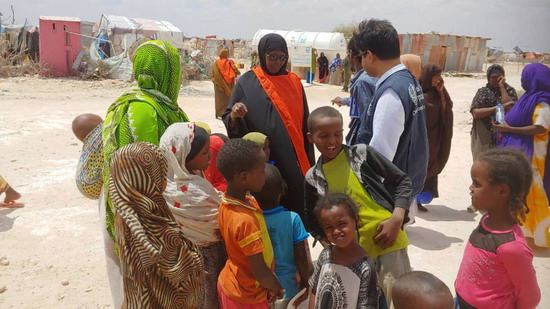 Mogadishu, 26 March 2019 – A nationwide polio immunization campaign has been launched in Somalia that will run from 24 to 27 March. The campaign aims to vaccinate an estimated 3.1 million children under the age of 5 in the country.
Mogadishu, 26 March 2019 – A nationwide polio immunization campaign has been launched in Somalia that will run from 24 to 27 March. The campaign aims to vaccinate an estimated 3.1 million children under the age of 5 in the country.
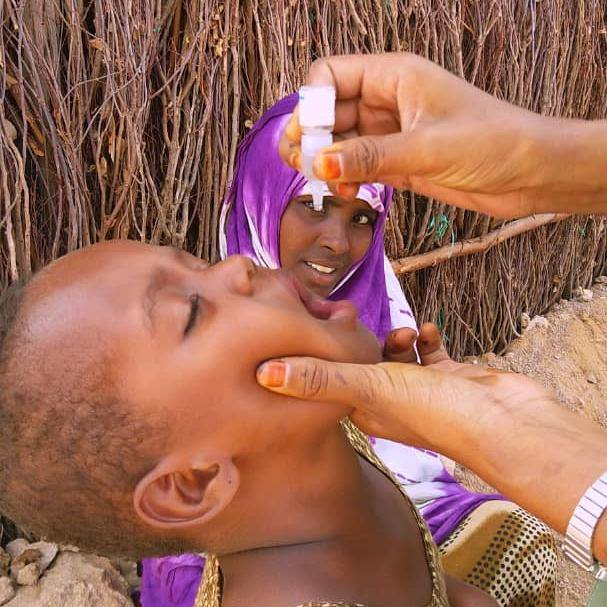 The campaign is part of WHO’s efforts to ensure that Somalia remains polio free as it has from indigenous wild poliovirus since 2014. However, 2 strains of circulating vaccine-derived polioviruses – vaccine-derived poliovirus type 2 (cVDPV2) and type 3 (cVDPV3) are concurrently circulating in the country and have left 12 Somali children paralyzed.
The campaign is part of WHO’s efforts to ensure that Somalia remains polio free as it has from indigenous wild poliovirus since 2014. However, 2 strains of circulating vaccine-derived polioviruses – vaccine-derived poliovirus type 2 (cVDPV2) and type 3 (cVDPV3) are concurrently circulating in the country and have left 12 Somali children paralyzed.
Since the first week of September 2018, the country has not witnessed any new case of cVDPVs in children with acute flaccid paralysis. The same virus has also been confirmed in Kenya. Vaccine-derived polio viruses are rare and only occur when polio vaccination rates are low resulting in low immunity against polio virus.
The national polio immunization campaign is being launched by the Government of Somalia with the active support of WHO and UNICEF. The campaign is being supported by the Global Polio Eradication Initiative.
 Around 15 000 frontline polio health workers are actively engaged in the campaign and will visit every house to ensure that all children under the age of 5 in the country get at least one single dose of oral polio vaccine during the campaign. Every under-immunized child, in every location in the country, including areas that have not been affected with the polioviruses yet, will be reached during this nationwide campaign.
Around 15 000 frontline polio health workers are actively engaged in the campaign and will visit every house to ensure that all children under the age of 5 in the country get at least one single dose of oral polio vaccine during the campaign. Every under-immunized child, in every location in the country, including areas that have not been affected with the polioviruses yet, will be reached during this nationwide campaign.
The campaign is part of WHO’s polio eradication initiative in Somalia which aims to keep the country free from polio and to build immunity of all children under 5 against poliovirus. Multiple vaccination campaigns are also being planned in the future as part of this initiative to protect Somali children against the threat of polio.
The WHO country office in Somalia is working with Somali health authorities to improve routine immunization for polio and other vaccine-preventable diseases and strengthen surveillance to ensure that the country remains polio free. Apart from maintaining high levels of vaccination coverage, WHO is also supporting national and local health authorities to maintain a robust surveillance system for acute flaccid paralysis and rapid outbreak response capacities to investigate and detect any suspected case of wild or vaccine-derived poliovirus early.


